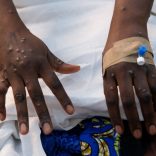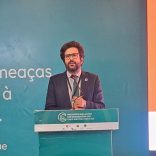Mpox: Mozambique strengthens border surveillance; suspected cases in 9 provinces
Mozambique: 1000 Rwandan troops arrive – By Joseph Hanlon

File photo: Twitter
Cabo Delgado war
- 1000 Rwandan troops arrive to protect Mueda and the gas
700 Rwanda soldiers and 300 police have been arriving in Cabo Delgado since 9 July. “Most – if not all – of the Rwandan troops will be based in Afungi, establishing a secure perimeter around the liquefied natural gas project there. Sources on the ground say that there is an ongoing offensive to clear the area around the gas projects, and that Rwandan troops will be charged with holding positions once they are cleared,” reported Cabo Legado (13 July).
Rwandan Deputy Inspector General of Police Felix Namuhoranye said units would be deployed to both Afungi and Mueda. (Taarifa 9 July) A communique released by the Government of Rwanda on 9 July said “The Rwandan contingent will support efforts to restore Mozambican state authority by conducting combat and security operations, as well as stabilisation and security-sector reforms.”
Rwanda is third among countries contributing troops to UN peacekeeping operations and has been involved in 14 peacekeeping missions. Thus its army is much better trained and more experienced and disciplined that Mozambique’s own army.
Meanwhile it is widely reported that Zimbabwean forces are already in Cabo Delgado. Zitamar (15 July) reported that “an unofficial deployment of troops from Rwanda and also Zimbabwe in June have been helping the FDS recapture Palma and the surrounding areas from the insurgents. Once the insurgents have been removed, the expectation is that Rwandan forces (both military and police) will be put in place to protect the TotalEnergies site” – along with the Mozambican Joint Task Force. “It’s unclear if this protection will also extend to the local population in the town of Palma and the Quitunda resettlement village, now home to thousands of refugees from Palma,” notes Zitamar.
Cabo Delgado governor Valige Tauabo, speaking to refugees in Quitunda on 14 July, appealed to local people to cooperate with foreign forces being deployed in the province.
Comment: The Rwanda statement is interesting in two ways. The two tasks are protecting the gas and protecting Mueda, which is symbolically important as the Makonde capital and also has become the government military centre. But the insurgents were getting close to Mueda and many people in the town thought that, like Palma and Mocimboa da Praia, it could not be defended. Putting Rwandan, Zimbabwean, and perhaps SADC (see below) troops there is a clear signal Mueda is to be defended by foreign troops.
The other important point is that Rwanda says its forces will be “conducting combat operations.” They are not there just to train Mozambicans, but to fight and win the war.
The total number of deaths in the war in now 3,103 according to Cabo Ligado (13 July)
- Keeping Portugal, EU, US & South Africa at arms length
Other foreign troops are also on their way, but Mozambique is less enthusiastic and is keeping them somewhat distanced from the fighting.
The first SADC forces should be arriving this week, although there has been some confusion. The Status of Forces Document had not been signed. The Herald (Harare, 13 July) said SADC wanted a South African major-general to command the brigade, with a Botswana colonel as the deputy commander. Mozambique expressed a strong preference for a Zimbabwean commander, citing successful past cooperation with Zimbabwean forces and Zimbabwe having more experience of successful counter-insurgency operations. A small SADC team from Zimbabwe and Botswana is already in Mueda. (Zitamar 5 July) The prior deployment of Rwandan troops clearly put South Africa’s nose out of joint. South Africa’s Defence Minister Nosiviwe Mapisa-Nqakula told the SABC on Saturday that it was “unfortunate” that Rwanda had deployed its troops into Mozambique before SADC.
But it will be hard for South Africa to be involved at all. Defence Minister Nosiviwe Mapisa-Nqakula plans to increase from 5,000 to 25,000 the troops responding to the insurrection in South Africa. What started with riots sparked by the jailing of former President Jacob Zuma expanded to widespread looting and violence – the biggest since the end of apartheid. At least 72 people have died and more than 1,700 have been arrested in South Africa’s worst unrest in years. (BBC 15 July)
Meanwhile Portugal has succeeded in getting more troops into Mozambique under a European Union umbrella. Portugal was president of the Council of the European Union until 30 June and used its position to press hard for a Portuguese military mission, to expand it small training programme already under way. On 12 July the European Council announced a two year mission to help Mozambique’s armed forces to build a “Quick Reaction Force” that aims to restore security to Cabo Delgado. The mission of around 120 people will arrive between September and October. It will provide military training including operational preparation, specialised training on counter-terrorism, and training and education on the protection of civilians and compliance with international humanitarian law and human rights law, the statement said.
The mission will be stationed at bases in Katembe, in Maputo, and in Chimoio, Manica province. Both are far away from the battle zone, underlining that the Portuguese will be kept at arms length.
In a further diplomatic balancing, the EU Training Mission in Mozambique (EUTM Mozambique) will be led by French Vice Admiral Herve Blejean, as commander, while Brigadier General Nuno Lemos Pires, of Portugal, will lead the mission on the ground as force commander.
Secretary of State Antony J. Blinken spoke on 14 July with Mozambican President Filipe Nyusi. US Spokesperson Ned Price said the Secretary and President reaffirmed the strength and importance of US-Mozambique relations and “our joint commitment to countering ISIS”.
- Comment: The elected one-party leaders club
Frelimo faces two problems in Cabo Delgado. First the state is now so corrupt that the military cannot defeat the insurgents. Second, who will help wealthy Frelimo oligarchs defeat a peasant uprising? Help must come from friends, or from those with vested interests who have reasons to turn a blind eye and accept the myth of outside destabilisation.
Rwanda, Zimbabwe and Mozambique are very similar. After decades, liberation leaders or parties continue to hold power and grow rich. When Emmerson Mnangagwa was overthrowing Robert Mugabe and the going got rough, he fled to Mozambique with he support of President Filipe Nyusi. The third member of the club is Rwanda’s President Paul Kagame. The three share similar interests and will provide mutual support without asking awkward questions.
Four other countries are pushing to send troops, but all have vested interests. The United States has wanted military bases in Mozambique for 40 years and has always coveted Nacala, and wants to turn Mozambique into its Africa base to fight ISIS – the next Afghanistan or Libya.
South Africa may be run by a corrupt liberation movement, but the ANC has never wanted to join the friends club – it wants to demonstrate that it is the African power. Its military is facing cuts and needs money, which it hopes to get from the EU for the SADC mission. It wants to take control of the Mozambique Channel. And the defeat of Renamo and its apartheid sponsors at the end of the Cold War still smarts, and it wants its soldiers back in Mozambique.
Portugal, too, wants to prove the it is still the colonial power and Mozambique needs it.
France owns gas company Total and also wants to control the Mozambique Channel.
There is a 14th century English proverb, “he who sups with the Devil should have a long spoon”. Frelimo clearly believes in this, and want to keep the EU, US, France and South Africa at a distance. jh
Oxford researcher says war is not Salafi-Jihadism, but instead challenges government.
Cabo Delgado insurgents “undoubtedly started as a Salafi group, [but[ they have, since militarisation, largely abandoned the trappings of Salafi-Jihadism, resorting instead to vague demands for increased political and religious representation within established structures.” The violent extremists (VE) “group is not a Salafi-Jihadi movement, and not currently connected in any impactful way to IS. … There is no evidence that VE have been recruiting extensively inter- nationally. Though Tanzanians, Gambians, Kenyans and Malawians may have joined the movement, with some even ascending to senior roles, the majority of militants are from Cabo Delgado,” write Thomas Heyen-Dube from Oxford University and Richard Rands.
It is more accurate to present VE as challengers to the established order. Their struggle is best understood as a challenge to authorities to secure increased political and religious representation, and socio-economic benefits” concludes a new paper published 7 July. It gives a clear and well-written religious and political history of the insurgency.
“VE believe that increased channels for political participation within the framework of national governance can be obtained through popular violent uprising. Such a project has become central to VE ideology and is even reflected in their self-perception, with the movement often referring to itself as ‘Swahili Sunna’, loosely translated as ‘Swahili Way’.”
“Since the start of the insurgency, VE have overwhelmingly targeted the authorities and those who actively support them. Authority figures such as religious elders, village elders, local administrators, public officials, policemen and politicians have all been associated with the government and have been perceived as sympathisers. Furthermore, Sufi elders and CISLAMO-affiliated preachers, whom VE consider impious and in league with the government, have also been marked as legitimate targets.”
The military and police have been the main target and the authors estimate 450 defence force (FDS) have been killed. “The majority of attacks initiated by VE have been against undefended town or villages, most of these incidents did not result in casualties. Out of around 600 town/village attacks conducted by VE since October 2017, only about 250 have resulted in confirmed casualties. In those 250 town/village attacks, upwards of 1400 civilians were killed.” The authors argue that “Though VE can display incredible levels of brutality, with beheadings and mutilations being commonplace, there is absolutely nothing exceptional about such methods in the context of non-state armed groups in Africa.”
Their argument about weak links to IS comes in part from ideology, which they discuss in detail. Salafi-Jihadi groups such as “IS, Boko Haram, Al-Qaeda all fanatically observe” certain strict religious rules, while what the authors call the “violent extremists (VE)” apply these principles loosely or not at all.
“Evolving doctrine and modus operandi: violent extremism in Cabo Delgado” by Thomas Heyen-Dubé and Richard Rands was published on 7 July in the aptly named academic journal Small Wars & Insurgencies. It is open access and available free.
By Joseph Hanlon












Leave a Reply
Be the First to Comment!
You must be logged in to post a comment.
You must be logged in to post a comment.